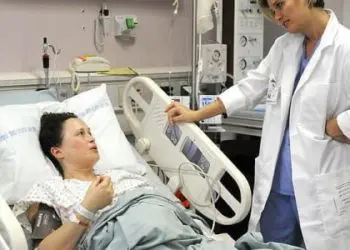Unexpected delivery outcomes associated with postpartum depression
1. Women who strongly preferred vaginal delivery but underwent cesarean delivery were more likely to experience depression at 8-10 weeks but not at 6-8 months postpartum.
2. Antepartum PHQ-9 score and income were predictors of depression at 8-10 weeks and 6-8 months postpartum.
Evidence Rating Level: 2 (Good)
Study Rundown: Postpartum depression is a condition that affects approximately 15% of women in the 12 months following delivery. It is a spectrum of disease that ranges in severity from postpartum blues, a transient condition during initial postpartum period characterized by minor depressive symptoms, to postpartum depression or even psychosis, in which patients experience disorganized thoughts in conjunction with mood symptoms. Risk factors include history of depression, young age, unplanned pregnancy, stress and poor social support. Because postpartum depression can significantly affect the daily functioning of new mothers, ACOG encourages screening in pregnancy such that most providers screen women at their initial prenatal visit, again in third trimester and again at 6 weeks postpartum. The present work is the first to explore the relationship between preference for mode of delivery and postpartum depression. The authors found that among women who strongly desired vaginal delivery but ended up having a cesarean delivery, PHQ-9 scores were higher at 8-10 weeks postpartum but not at 6-8 months postpartum. This finding suggests that discrepancies between preferred and actual mode of delivery might affect mood and recovery after delivery such that a higher degree of concern might be appropriate in these women.
Limitations of the study include a population that is older and more educated than the general pregnant population. Additionally, the number of participants who preferred vaginal delivery but delivered via cesarean was small. Future work should include prospective studies of larger and more diverse populations. Qualitative interviews may also provide additional insight into the mechanism of the association identified herein, such as a personal sense of failure or perceived disappointment from friends and family that vaginal delivery was not achieved.
Click to read the study in AJOG
Relevant Reading: Screening for depression during and after pregnancy
Study Author, Dr. Kathryn Houston, MD, MA, talks to 2 Minute Medicine: University of California, San Francisco, Assistant Professor, Department of Obstetrics, Gynecology & Reproductive Sciences.
“Women’s preferences for mode of delivery are important and can affect their postpartum experience. Women who had a strong preference for vaginal delivery but underwent a cesarean section are at risk for postpartum depression. Awareness of this can help clinicians improve postpartum care for those patients.”
In-Depth [prospective cohort]: This study investigated the relationship between antepartum preference for mode of delivery (assessed with the standard gamble method) and postpartum depression (evaluated using the PHQ-9) in 160 pregnant women. The primary outcome of interest was PHQ-9 score at 8-10 weeks postpartum; a secondary outcome was PHQ-9 score at 6-8 months postpartum.
Nearly all participants stated that their preferred mode of delivery was vaginal delivery; the mean preference score was 0.658 (SD ±0.352). Among women who underwent a cesarean delivery, higher preference score for vaginal delivery was associated with higher PHQ-9 score at 8-10 weeks (p=0.027). For every 0.10 point increase in preference score for a route of delivery other than they desired (desired vaginal but experienced cesarean delivery), there was a 0.25 increase in PHQ-9 score.
More from this author: Postoperative pain similar in robotic and conventional laparoscopy for gynecologic procedures, Intrahepatic cholestasis of pregnancy linked to poor outcomes, Severe acne linked to endometriosis, Postpartum pelvic floor muscles may have limited value, Vitamin D not effective in reducing recurrent bacterial vaginosis
Image: PD
©2012-2014 2minutemedicine.com. All rights reserved. No works may be reproduced without expressed written consent from 2minutemedicine.com. Disclaimer: We present factual information directly from peer reviewed medical journals. No post should be construed as medical advice and is not intended as such by the authors, editors, staff or by 2minutemedicine.com. PLEASE SEE A HEALTHCARE PROVIDER IN YOUR AREA IF YOU SEEK MEDICAL ADVICE OF ANY SORT.







